Main jo aag lagata hoon use boojhana bhi jaanta hoon (‘Kati Patang’)…
Main wo bala hoon jo sheeshe se patthar ko todta hoon (‘Souten’)…
Nangaa nahaayega kya aur nichodega kya (‘Dulhe Raja’)…
Mera naam hai Prem… Prem Chopra (‘bobby’)…
Truly Prem Chopra needs no introduction. While his name means love, he spewed hate on screen and invited it off-screen as well. That he harassed husbands and ran to hide wives is an extended appreciation of his craft. As an actor, that only validated his authenticity.
Adaptable and friendly, he built a profitable team with superstars Manoj Kumar, Dev Anand, Dilip Kumar, Rajesh Khanna And Amitabh Bachchan… playing the nemesis in blockbuster after blockbuster between the ’60s-’80s. Moving forward, he reinvented himself to choose character roles and enjoy good reviews.
From an employee of the Times of India’s circulation department to his interviews that have graced the pages, Prem Chopra is no less than a bestseller. An exclusive interview with the bad boy of Bollywood, who enjoys the well-known popularity…
From your hometown Shimla to the show town of Mumbai… How did your journey towards Hindi films begin?
I was studying in BM College, Shimla. My father wanted me to become an IAS officer or a doctor. But there I developed a taste for the stage and participated in plays. It inspired me to try my luck in the film industry. Papa said, ‘I will not stop you. But you have to defend yourself. I won’t be able to send you money’. I came to Mumbai in the early 1960s. Initially, I did some odd jobs and then got a job in the circulation department of Times of India. I worked there for about three to four years. I was getting good salary in TOI. Meanwhile, I kept trying to take breaks in films. Initially I faced rejection. In those days the producers’ offices were around Mahalaxmi and Naaz Theatres. I used to go to meet him. But he didn’t have time to meet me. I was asked to leave my photos and contact numbers behind. But they never came back.
During those struggling days, did you ever reach the point when you thought of quitting?
A special incident happened in the early days when I was playing a hero in Punjabi films. A major portion of the film ‘Sapni’ (1963) had already been shot. We had to shoot some scenes at Mahalaxmi Studios. I had to take out a snake from the pitra (basket) and say, ‘Puttar le apna vendge!’ But being afraid of snakes, it made me restless. I froze in fear. I chanted mantras and tried to shoot. But as soon as the snake peeped through; I would take my hand back.
The director lost his cool after a few retakes. He said, ‘Don’t be afraid! The venom of the snake has been removed’. But touching the snake gave me a terrible feeling. I took off my turban and left. The producer followed me and the director followed him. They could not afford to take my place. To be honest, I thought of leaving the industry that day. In the end, the scene was shot with a plastic snake. The film was a hit. Years later, I had to shoot with a snake in Dilip Kumar’s Bairag. Dilip sahib was aware of my phobia. He wisely suggested that I use a danda (stick) to pick up the snake in the scene.
How did you get your first break in Hindi films?
I made my debut in 1960 with Bharat Bhushan starrer ‘Mud Mitti Ke Na Dekh’. The same year I did the Punjabi film ‘Chowdhary Karnail Singh’, a love story, which won a National Award. I did a few films as a hero which include ‘Main Shaadi Karne Chala’, ‘Kunwari’, ‘Sikandar-e-Azam’…
Raj Khosla’s ‘Who was she?’ Turning Point was playing the villain. (1964) and Sukhdev, a gray character in Manoj Kumar’s ‘Shaheed’ (1965). Afterwards Nasir Hussain‘Teesri Manzil’, Raj Khosla’s ‘Mera Saaya’ (both in 1966) and most importantly Manoj Kumar’s ‘Upkar’ (1967) did not look back. I started doing double shifts. This was the first time I felt that I could settle down in Mumbai. Initially I was sharing a room with four people in a guest house. Then I shifted to a room.
In the past, you have been quite vocal about the support and contribution made by Manoj Kumar in the early days of his career.
Manoj Kumar was a wise man. He was a total cinema man. He wrote his own scripts, directed his own films, financed them, and even played lead roles. I acted in films directed by him – ‘Yaadgaar’, ‘Purab Aur Paschim’ and ‘Kranti’ as well as director Sohanlal Kanwar’s ‘Sanyasi’ and ‘Be-Iman’ (between 60s – 80s) . His contribution to later films was enormous.
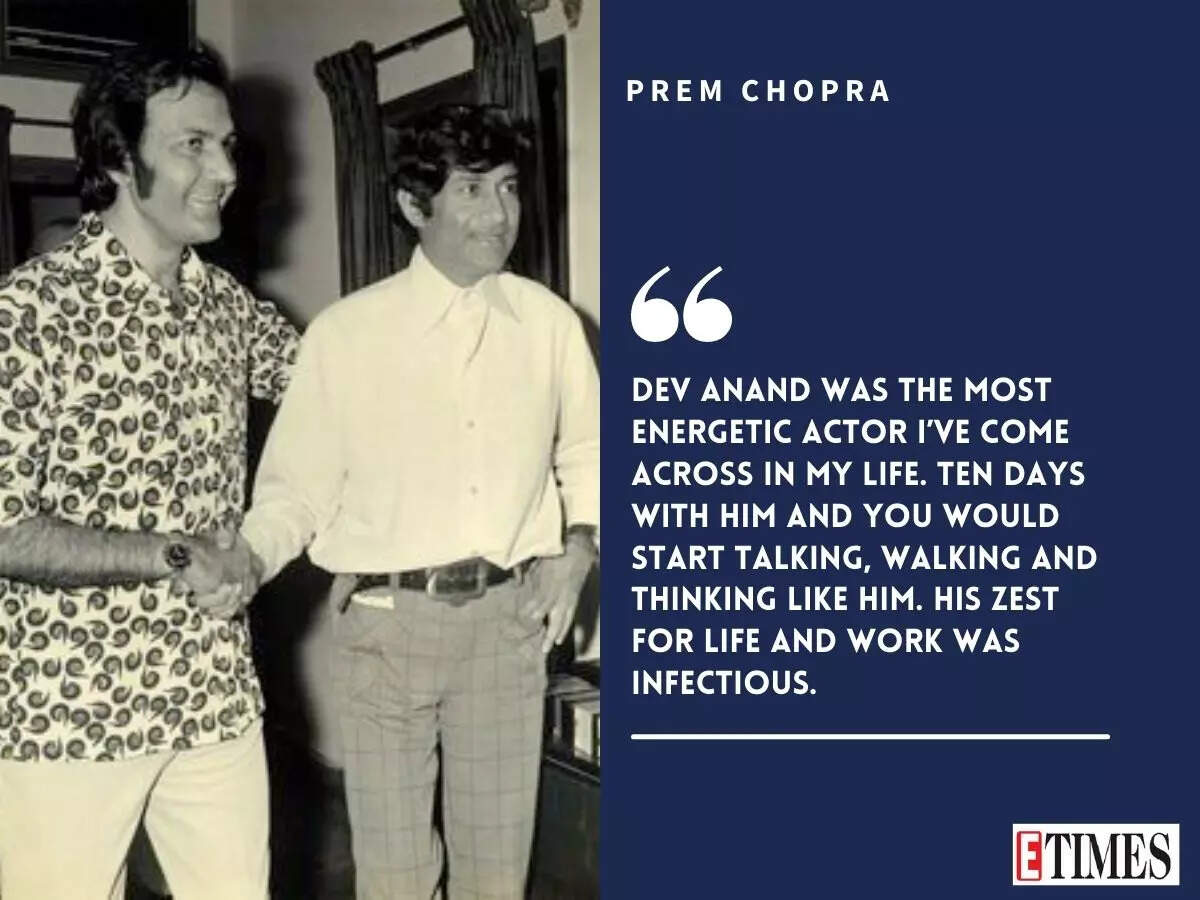
What did your association with Dev Anand teach you?
When I was studying in Shimla, a release of Dev Anand meant that all the girls would be bunking classes that day. The girls were absolutely crazy about him. ‘Hare Rama Hare Krishna’ (1971) was my first and superhit film with him. Then, he liked me. I was in almost all his films including ‘Chhupa Rustom’, ‘Des Pardes’ and ‘Lootmaar’.
Dev Anand was the most energetic actor in my life. Ten days with him and you will start talking, walking and thinking like him. His enthusiasm for life and work was infectious. He didn’t care whether his films played or not. He created them with conviction. He would say, ‘If you didn’t like it, you didn’t like it man. Ok’. He will soon start another project.
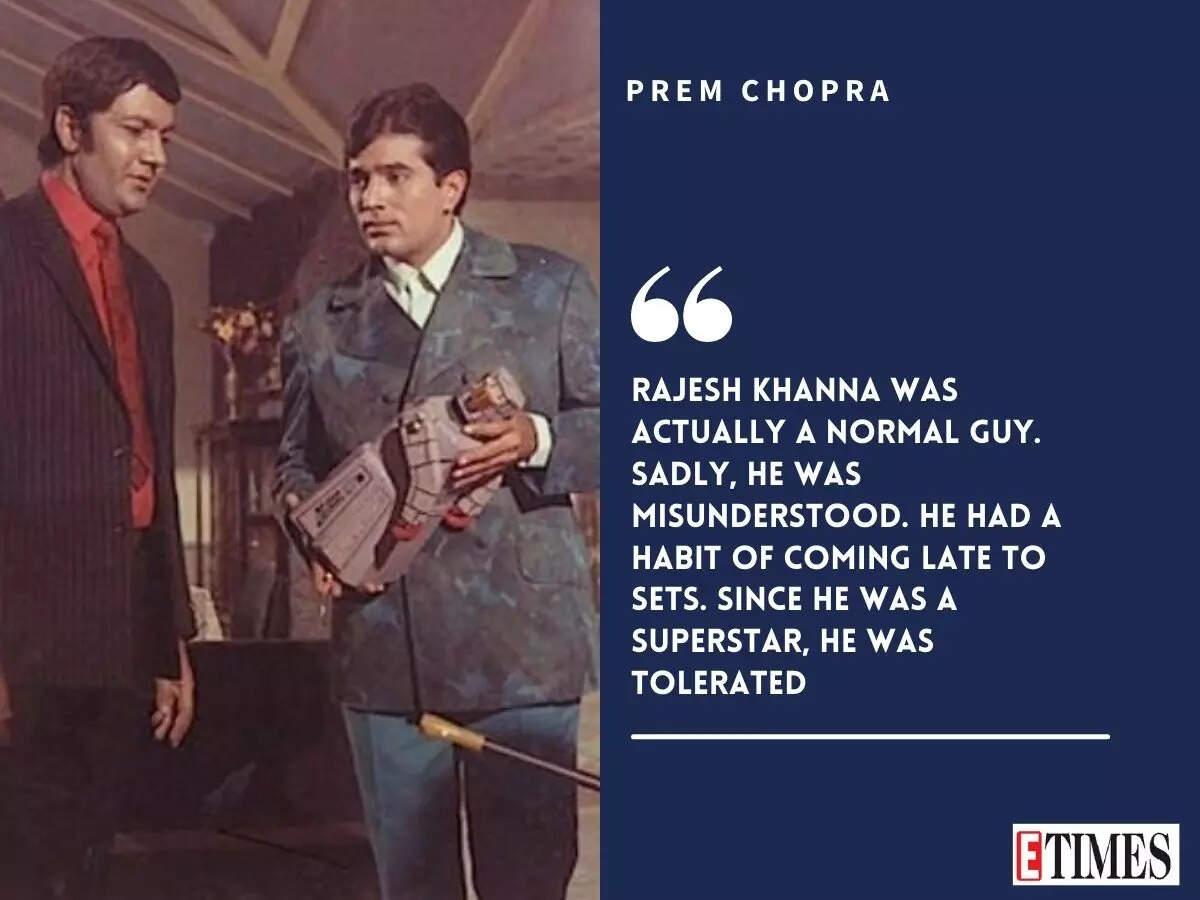
You are one of the few people who witnessed Rajesh Khanna’s superstardom and then closely watched his decline.
Yes. Most of our films were hits starting with ‘Do Raaste’ and ‘Kati Patang’ (both in 1969). We were singles in those days. We were friendly and shared a lot of things. (smiling) Although all that cannot be shared here. Rajesh Khanna was really a common man. Unfortunately, he was misunderstood. He had a habit of being late on the sets. Since he was a superstar, he was tolerated. But as soon as he came on the set he gave his everything. Crowds gathered to see him.
Movies are a commercial business. When a film is a hit, the hero gets the most. If it fails, the hero most likely bears the brunt. The offers for Rajesh’s films kept falling. People started turning away from him. He went into depression. He could not digest the failure. Things change in showbiz. One cannot remain a superstar forever. Like Amitabh Bachchan Character roles began to be performed decently. He accepted the change. But Rajesh lost interest. Unfortunately, he succumbed to cancer. Obviously, it’s time. Relieve!’ Those were the last words he spoke before leaving.
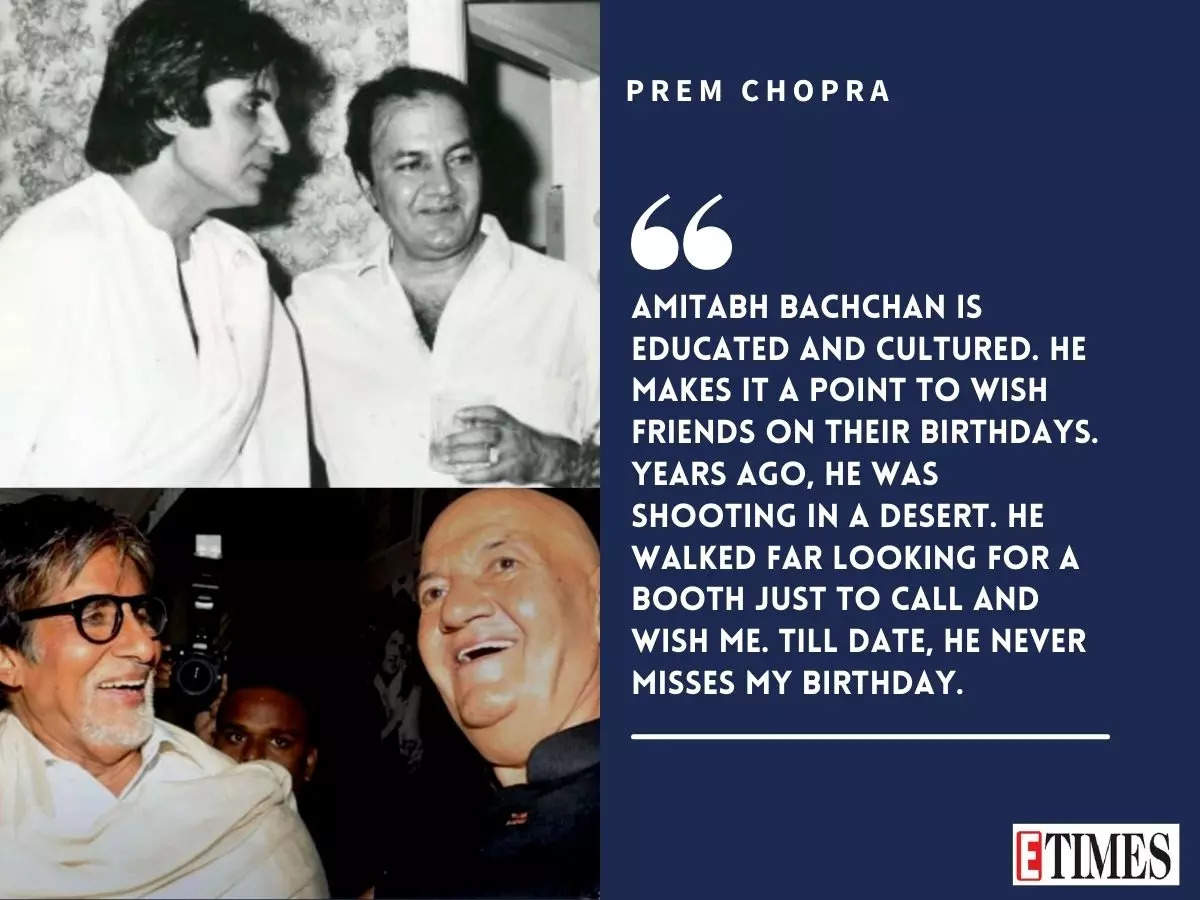
You have played wonderful innings with Amitabh Bachchan as well. What are your thoughts, especially on the longevity of his career?
Amitabh always had immense potential and a unique personality, something I saw during the preview of Parwana (1971). In this, he played the role of anti-hero. I couldn’t stop remarking that this actor would cause trouble for others. Although his early films did not do much, Prakash Mehra‘Zanjeer’ (1973) did the trick for him. People loved working with him for two reasons. One, he was disciplined and punctual. He used to reach the sets at 8.45 am for the shoot at 9 am. Secondly, he delivered the goods brilliantly. Till date he is considered a superstar. As a person, he is educated and cultured. He wishes his friends on their birthdays. Years ago he was shooting in a desert. He went too far looking for a booth, just to call and congratulate me. Till date he has never missed my birthday.
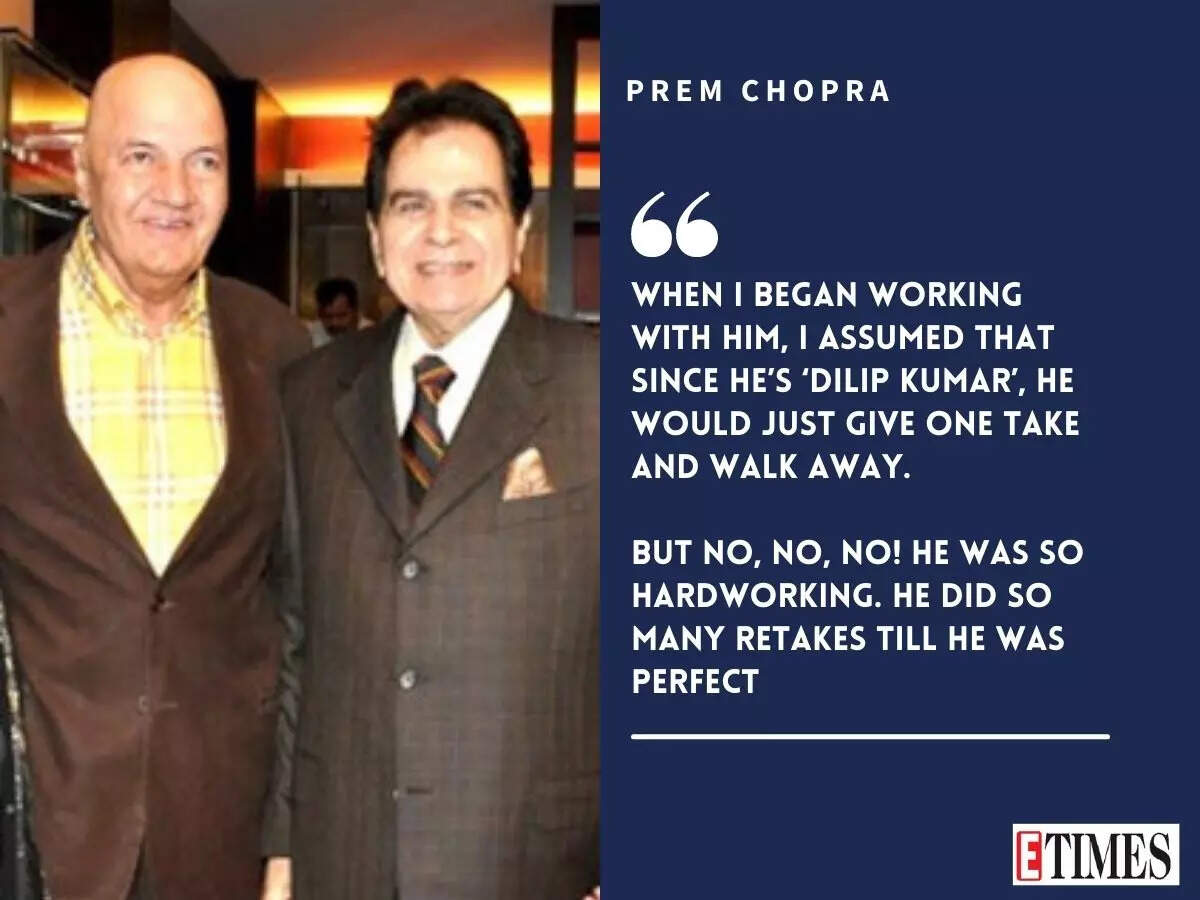
What are your memories of Dilip Kumar? You have also worked with him on many occasions.
I got the opportunity to work with Dilip sahab for the first time in ‘Dastaan’ (1972). In the 80s we did ‘Bairaag’, ‘Kranti’ and ‘Duniya’. Dilip Kumar was the greatest actor India has ever produced. He introduced the ‘underplay’ style of acting, which was followed by many. He was a textbook for actors.
When I started working with him, I felt that since he is ‘Dilip Kumar’, he will just give one take and leave. But no, no, no! He was so hardworking. He did several retakes until he was perfect. I was astonished. It inspired me and taught me that to get success you must be honest and hard working towards your work.
Dilip sahib was educated and educated. It was great to be in his company. He enjoyed Sher-o-Shayari. He spoke pure Urdu and I also spoke Urdu with him. In the beginning, I was goofy and we had a good laugh over it.
You have had a long career spanning several decades. Have you ever faced any professional rivalry? Did the other actors who also played the antagonist compete with each other?
I did not believe in politics. It was just about doing my job and getting out. People who do gossip and politics get caught in it.
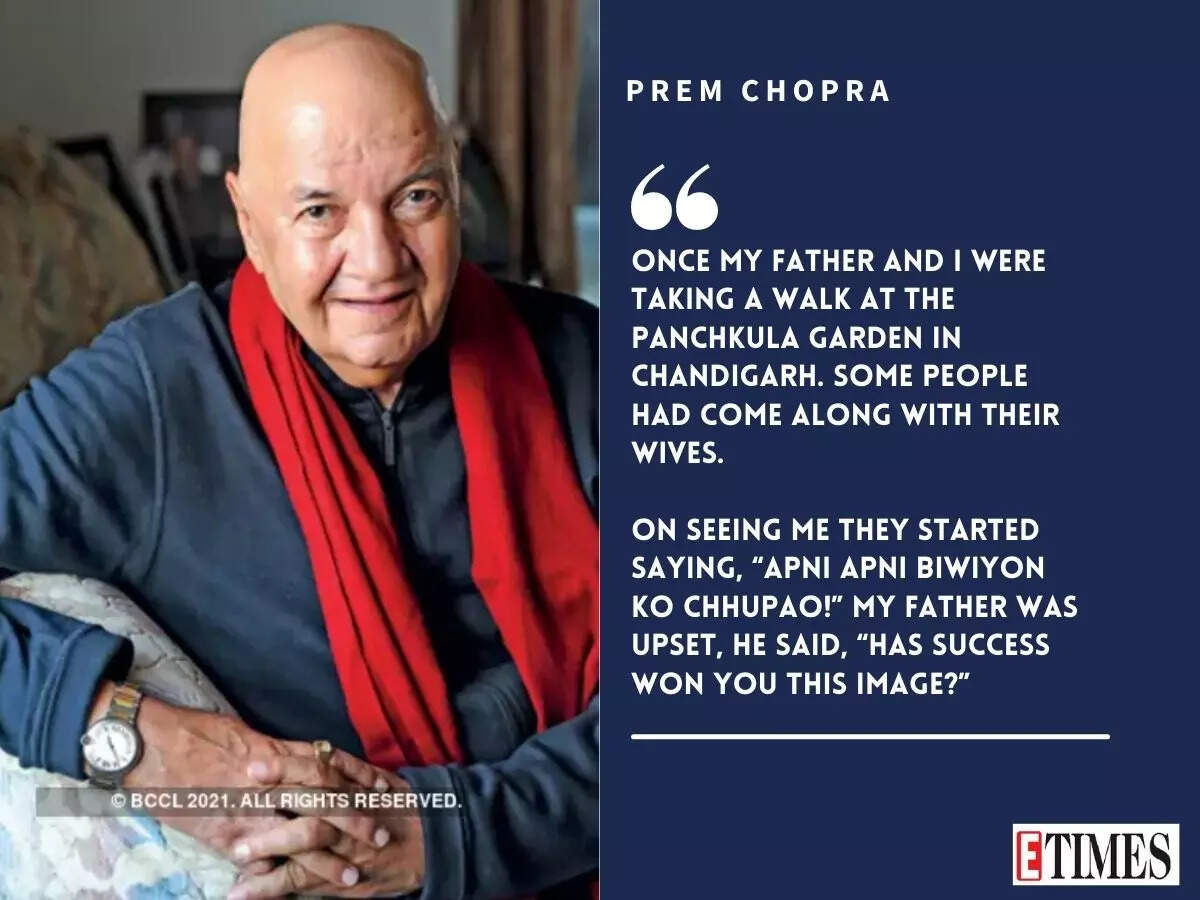
How did your ‘negative’ screen image affect your real life?
Some people used to get scared of me taking my screen image seriously. Once my father and I were taking a walk in Panchkula Garden, Chandigarh. Some people came with their wives. As soon as they saw me they started saying, “Hide your wives!” My father was upset by the reaction. He said, “Has success given you this image?” One thing to say, I went across and talked to the husbands nicely. He was pleasantly surprised to see me so normal. I told him that what I do is my job, not my life.
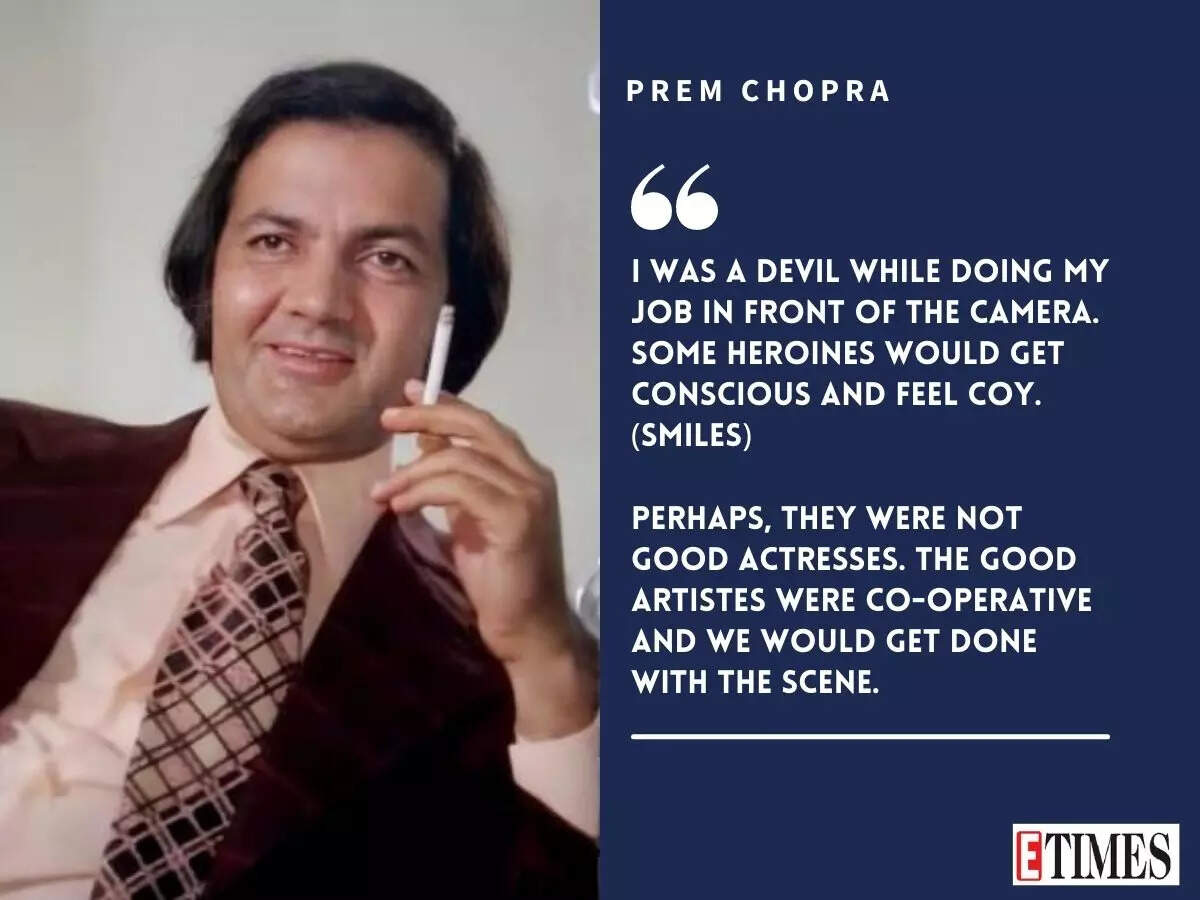
Was it difficult for a gentleman like you to handle scenes full of vulgarity and molestation on screen?
I was a freak doing my thing in front of the camera. Some heroines would come to their senses and blush. (smiling) Maybe, they weren’t good actresses. The good actors were cooperative and we will be working with the scene. My wife Uma understood that all this is part of my profession. She belongs to a film family who is herself the younger sister of Krishnaji Raj Kapoor.
After working for six decades in various film industries, what has been your biggest learning?
You get typecast in the industry. But now things have changed. Slowly, I started doing character roles. I tried comedy in ‘Agent Vinod’ and ‘Golmaal 3’. ‘Koi… Mil Gaya’, ‘Bunty Aur Babli’ and ‘Money Hai To Honey Hai’ had interesting characters for me. In ‘Rocket Singh – Salesman of the Year’, I played Ranbir Kapoor’s grandfather, a role that garnered me good reviews. An actor has to adapt to the times.
,